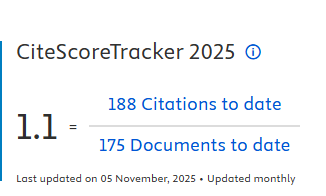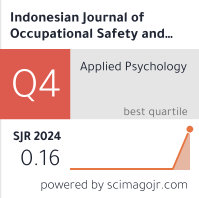Correlation of Age, Nutritional Status, and Smoking Habits with Work Fatigue in Dome Installation Workers
Downloads
workers mostly (81.8%) experienced mild work fatigue and were aged ≤ 35 years, had normal nutritional status, and were mild smokers. Conclusion: There was a weak relationship between age and nutritional status with work fatigue and a very
weak relationship between smoking habits with work fatigue.
Keywords: age, nutritional status, smoking habits, work fatigue
Amalia, I. and Widajati, N. (2019) ‘Analisa Kelelahan Kerja Secara Obyektif Berdasarkan Reaction Timer pada Tenaga Kerja Unit Pengerolan Besi PT X', Journal of Health and Science Prevention, 3(1), pp. 16–24.
Atiqoh, J., Wahyuni, I. and Lestantyo, D. (2014) ‘Faktor-Faktor yang Berhubungan dengan Kelelahan Kerja pada Pekerja Konveksi Bagian Penjahitan di CV. Aneka Garment Gunungpati Semarang', Jurnal Kesehatan Masyarakat (e-Journal), 2(2), pp. 119–126.
Badan Penyelenggara Jaminan Sosial Ketenagakerjaan (BPJS Ketenagakerjaan) (2019) Angka Kecelakaan Kerja Cenderung Meningkat, BPJS Ketenagakerjaan Bayar Santunan Rp1,2 Triliun. Jakarta: BPJS Ketenagakerjaan.
Crawford, J. O. et al. (2016) The Ageing Workforce: Implications for Occupational Safety and Health” A Research Review. Executive Summary.
Europe: European Agency for Safety and Health at Work.
Deyulmar, B. A., Suroto and Wahyuni, I. (2018) ‘Analisis Faktor-Faktor yang Berhubungan dengan Kelelahan Kerja pada Pekerja Pembuat Kerupuk Opak di Desa Ngadikerso, Kabupaten Semarang', Jurnal Kesehatan Masyarakat (e-Journal), 6(4), pp. 278–285.
Dirgayudha, D. (2014) Faktor-Faktor Yang Berpengaruh terhadap Kelelahan Kerja pada Pembuat Tahu di Wilayah Kecamatan Ciputat dan Ciputat Timur Tahun 2014. Undergraduate Thesis. Jakarta: Faculty of Medicine and Health Science, Universitas Islam Negeri Syarif Hidayatullah Jakarta.
Ekawati, H., Rahmawati, A. Y. and Wijaningsih, W. (2016) ‘Faktor Determinan Kelelahan Kerja pada Tenaga Penjamah Makanan di Instalasi Gizi RS dr R Soetijono Blora', Jurnal Riset Gizi, 4(2), pp. 1–8.
Febriyanto, K., Gunawan, M. C. and Amalia, N. (2019) ‘Hubungan Kebiasaan Merokok dengan Kelelahan Kerja pada Petugas Pemadam Kebakaran Kota Samarinda', Jurnal Dunia Kesmas, 8(1), pp. 19–24.
Gaghiwu, L., Josephus, J. R. and Rizald M., R. (2016) ‘Analisis Beberapa Faktor Penyebab Kelelahan Kerja pada Tenaga Kerja Bongkar Muat di Pelabuhan Samudera Bitung', Paradigma, 4(1), pp. 59–70.
Hermawan, B., Soebijanto, S. and Haryono, W. (2017) ‘Sikap, Beban Kerja, dan Kelelahan Kerja pada Pekerja Pabrik Produksi Aluminium di Yogyakarta', Berita Kedokteran Masyarakat (BKM Journal of Community Medicne and Public Health), 33(4), pp. 213–218.
Hockey, R. (2013) The Psychology of Fatigue: Work, Effort, and Control. New York: Cambridge University Press.
International Labour Organization ( 2013 ) Keselamatan dan Kesehatan Kerja Sarana dan Produktivitas. Geneva: International Labour Organization.
Juliana, M., Camelia, A. and Rahmiwati, A. (2018) ‘Analisis Faktor Risiko Kelelahan Kerja pada Karyawan Bagian Produksi PT. Arwana Anugrah Keramik, Tbk', Jurnal Ilmu Kesehatan Masyarakat, 9(1), pp. 53–63.
Khasanah, I. M., Suwaji and Kurniawan, T. P. (2016) Hubungan Risiko Kerja Berdiri dengan Tingkat Kelelahan Kerja Pada Operator Mesin Tenun PT. Iskandar Indah Printing Textile Surakarta. Universitas Muhammadiyah Surakarta.
Komalig, M. R. and Kawoka, D. (2018) ‘Hubungan Status Gizi dengan Kelelahan Kerja pada Buruh di Pelabuhan Laut Kota Manado', Journal of Community and Emergency, 6(2), pp. 104–109.
Maurits, L. S. K. (2010) Selintas Tentang Kelelahan Kerja. Yogyakarta: Amara Books.
Ministry of Health (2011) Pedoman Pemenuhan Kecukupan Gizi Pekerja Selama Bekerja. Jakarta: Direktorat Jendral Bina Kesehatan Masyarakat, Ministry of Health of the Republik of Indonesia.
Ministry of Health (2012) Penyakit Tidak Menular. Jakarta: Direktorat PPTM, P2PL Ministry of Health of the Republik of Indonesia.
Oktariani, R., Rakhma, L. R. and Kurniawan, A. (2019) ‘Sarapan Pagi, Status Gizi, dan Kelelahan Kerja pada Karyawan di Brownies Cinta Karanganyar', Jurnal Dunia Gizi, 2(2), pp. 79–84.
Prastuti, T. N. and Martiana, T. (2016) ‘Analisis Karakteristik Individu dengan Keluhan Kelelahan Kerja pada Pengemudi Taksi Di Rungkut Surabaya', The Indonesian Journal of Public Health, 11(1), pp. 64–74.
Rijanto, B. (2010) Pedoman Praktis Keselamatan, Kesehatan Kerja, dan Lingkungan Kerja (K3L) Industri Konstruksi. Jakarta: Mitra Wacana Media.
Sartika, L., Suroto and Ekawati (2019) ‘Hubungan antara Durasi Kerja, Beban Kerja Fisik, dan Beban Kerja Mental Terhadap Kebugaran Jasmani pada Pekerja Konstruksi PT. X Kota Semarang', Jurnal Kesehatan Masyarakat (e-Journal), 7(4), pp. 61–66.
Sartono, Martaferry and Winaresmi (2016) ‘Hubungan Faktor Internal dan Faktor Eksternal Karyawan Dengan Kelelahan Kerja pada Karyawan Laundry Garment di Bagian Produksi CV. Sinergie Laundry Jakarta Barat Tahun 2013', Artikel Kesehatan Masyarakat, 1(1), pp. 64–72.
Suma'mur, P. K. (2014) Higiene Perusahaan dan Kesehatan Kerja (HIPERKES). Edisi 2. Jakarta: CV Sagung Seto.
Suoth, L. F., Pinontoan, O. R. and Doda, D. V. (2017) ‘Hubungan antara Umur, Status Gizi, dan Beban Kerja Fisik dengan Kejadian Kelelahan Kerja pada Pekerja di PT. Nichindo Manado Suisan', KESMAS, 6(2), pp. 1–15.
Suryaningtyas, Y. and Widajati, N. (2017) ‘Iklim Kerja dan Status Gizi dengan Kelelahan Kerja pada Pekerja di Ballast Tank Bagian Reparasi Kapal PT. X Surabaya', Jurnal Manajemen Kesehatan Yayasan RS Dr. Soetomo, 3(1), pp. 31–46.
Syamsuddin, M. Z. and Gerung, J. (2018) ‘Faktor- Faktor yang Berhubungan dengan Kelelahan Kerja pada Pekerja Meubel di Kecamatan Poasia Kota Kendari', Jurnal MJPH, 1(2), pp. 1–12.
Tarwaka (2015) Ergonomi Industri: Dasar-Dasar Pengetahuan Ergonomi dan Aplikasi di Tempat Kerja. Edisi 2. Surakarta: Harapan Press.
Tarwaka, Bakri, S. H. A. and Sudiajeng, L. (2004) Ergonomi untuk Keselamatan, Kesehatan Kerja, dan Produktivitas. Surakarta: UNIBA Press.
Tenggor, D., Pondaag, L. and Hamel, R. S. (2019) ‘Faktor-Faktor yang Berhubungan dengan Kelelahan Kerja pada Pekerja di Ruang Rawat Inap Rumah Sakit Umum GMIM Pancaran Kasih Manado', e-Journal Keperawatan, 7(1), pp. 1–8.
Triyunita, N., Ekawati and Lestantyo, D. (2013) ‘Hubungan Beban Kerja Fisik, Kebisingan, dan Faktor Individu dengan Kelelahan Pekerja Bagian Weaving PT. X Batang', Jurnal Kesehatan Masyarakat Universitas Diponegoro, 2(2), pp. 1–11.
Verawati, L. (2016) ‘Hubungan Tingkat Kelelahan Subjektif dengan Produktivitas pada Tenaga Kerja Bagian Pengemasan di CV Sumber Barokah', The Indonesian Journal of Occupational Safety and Health, 5(1), pp. 51–60.
Wahyuni, D. and Indriyani, I. (2019) ‘Faktor-Faktor yang Berhubungan dengan Kelelahan Kerja pada Pekerja Bagian Produksi di PT. Aantam Tbk. UBPP Logam Mulia', Jurnal Ilmiah Kesehatan, 11(1), pp. 73–79.
Witjaksani, A. D. and Darnoto, S. (2018) ‘Hubungan antara Beban Kerja dengan Keluhan Low Back Pain (LBP) pada Kuli Panggul Perempuan di Pasar Legi Surakarta', in Proceeding of The URECOL, pp. 487–492.

In order to be accepted and published by The Indonesian Journal of Occupational Safety and Health, Author(s) who submit an article should complete all the review process. The copyright of received articles assigned to the The Indonesian Journal of Occupational Safety and Health and Department of Safety and Health, Universitas Airlangga as publishers of the journal. The intended copyright includes the rights to publish articles in various forms (including reprints).
The Editorial Team of The Indonesian Journal Of Occupational Safety and Health and Department of Safety and Health strive to ensure that no errors occur in the articles that have been published, both data errors and statements in the article.
Users of this website will be licensed to use materials from this website following the Creative Commons Attribution-NonCommercial-ShareAlike 4.0 International License. No fees charged. Please use the materials accordingly.
------------------------------------------------------------------------------------------------------------------------------------------------------------------------------------------
Attribution ” You must give appropriate credit, provide a link to the license, and indicate if changes were made. You may do so in any reasonable manner, but not in any way that suggests the licensor endorses you or your use.
NonCommercial ” You may not use the material for commercial purposes.
ShareAlike ” If you remix, transform, or build upon the material, you must distribute your contributions under the same license as the original.







 How to Submit Articles in OJS
How to Submit Articles in OJS

























